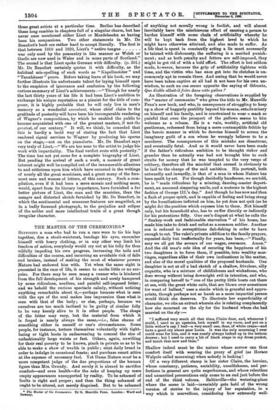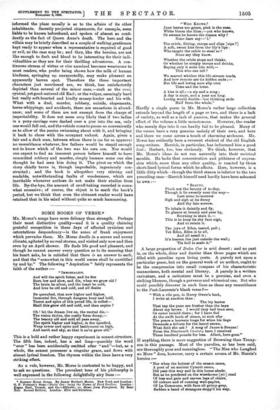THE MASTER OF THE CEREMONIES.• Surrosuca a man who had
to run a race were to tie his legs together, don a strait-waistcoat, bandage his eyes, encumber himself with heavy clothing, or in any other way limit his freedom of action, everybody would cry out at his folly for thus wilfully impeding his own progress, increasing the toils and difficulties of the course, and incurring an avoidable risk of falls and bruises, instead of making the most of whatever powers Nature had endowed him with. Yet when the same sight is presented in the race of life, it seems to excite little or no sur- prise. For there may be seen many a runner who is hindered from the full development of his strength and sorely hampered by some ridiculous, needless, and painful self-imposed fetter ; and we behold the curious spectacle calmly, without noticing anything remarkable about it,—perhaps because what is seen with the eye of the soul makes less impression than what is seen with that of the body ; or else, perhaps, because we ourselves are too mach inclined to be guilty of similar folly to be very keenly alive to it in other people. The shape of the fetter may vary, but the material from which it is forged is nearly always the same,—i.e., false shame of something either in oneself or one's circumstances. Some people, for instance, torture themselves voluntarily with tight- lacing or tight boots in endeavouring to conceal the size of unfashionably large waists or feet. Others, again, unwilling for their real poverty to be known, pinch in private so as to be able to make a show of wealth in public ; stint daily bread in order to indulge in occasional feasts; and purchase smart attire at the expense of necessary fuel. Yet Dame Nature must be a more competent judge of the due proportions of the human figure than Mrs. Grundy. And surely it is absurd to sacrifice comfort—and even health—for the sake of keeping up mere empty appearances unsupported by reality. To be ashamed of faults is right and proper; and then the thing ashamed of ought to be altered, not merely disguised. But to be ashamed
• The Master of the Ceremonies. By G. Manville Fenn. London : Ward and Downey.
of anything not morally wrong is foolish, and will almost inevitably have the mischievous effect of causing a person to burden himself' with some chain of artificiality whereby he will be kept back from the highest level to which he might have otherwise attained, and also made to suffer. As a life that is spent in constantly acting a lie must necessarily be tainted with dishonesty, the suffering is a merited punish- ment; and as both penalty and fetters are self-imposed, they might be got rid of with a bold effort. The effort is but seldom made, however, because the grip of artificiality tightens with time, and the victim who has once got into its clutches is un- commonly apt to remain there. And seeing that he would never have been taken captive at all had it not been for his own an- wisdom, to such an one seems apposite the saying of G4ronte, Qws diable faire dans cetto gal6re ?
An illustration of the foregoing observations is supplied by the "master of ceremonies" who gives the title to Mr. Manville Fenn's new book, and who, in consequence of struggling to keep up a show of beggarly gentility beyond his means, entails misery on himself and his family, and is constrained to wear a mask so painful that even the prospect of the gallows seems to him welcome as a release. He is a vain, worldly, artificial old gentleman, redeemed from being a mere contemptible fribble by the heroic manner in which he devotes himself to screen the imaginary guilt of a son whom he wrongly believes to be a murderer. The consequences of this mistake are disastrous, and eventually fatal. And as it would never have been made if the father's ridiculous ambition to be thought richer and grander than he actually was had not brought him to such straits for money that he was tempted to the very verge of robbery, therefore all the mischief that ensued is obviously to be laid to the charge of the said ambition. His portrait, both outwardly and inwardly, is that of a man in whom Nature has been spoilt by art. For though decidedly handsome, we are told, he is " made ridiculous by a mincing, dancing-master deport- ment, an assumed simpering smile, and a costume in the highest fashion of George 1II.'s day." And though he has now and then a flash of proper spirit, and is capable of feeling and being stung by the humiliations inflicted on him, he yet does not quit (as he might do) the position which exposes him to them. Not himself only, but his household also, has to suffer directly or indirectly for his pretentious folly. One son's disgust at what he calls the " flunkey-work and fashionable starvation " of his home, has made him take to drink and enlist as a common soldier. Another son is reduced to surreptitious dab-fishing in order to have enough to eat. The valet's private addition to the family prayers, repeated daily but ineffectually for years, has been,—" Finally, may we all get the arrears of our wages, evermore. Amen."
And the old man's sole idea of securing the happiness of his two daughters is to force them, if possible, into wealthy mar- riages, regardless alike of their own inclinations in the matter, and also of the moral qualities of the proposed husbands. One daughter is not at all a bad sketch of a shallow, frivolous, silly coquette, who is a mixture of childishness and wickedness, who does wrong without being downright evil in intention, and who, in comparing herself to " one of the pretty little boats out there at sea, with the great white sails, that are blown over sometimes for want of ballast," uses a simile which is graceful and appro- priate, though perhaps not as harsh as a more impartial person would think she deserves. To illustrate her superficiality of character, we cite an extract wherein she is relating complacently how she mourned on the sly for the husband whom she had married on the sly :—
" I suffered very much all that time, Claire dear, and, whenever I could, I need to go upstairs, lock myself in my room, and put on a little widow's cap I had—a very small one, dear, of white crape—and have a good cry about poor Louis. It was the only mourning I ever could wear for him, and it was nearly always looked up in the bottom drawer ; but I used to carry a bit of black crape in my dress pocket, and touch that now and then."
Shallow indeed must be the nature whose sorrow can thus comfort itself with wearing the proxy of grief (as Horace Walpole called mourning) when nobody is looking !
Of a very different stamp is her sister Claire, the heroine, whose constancy, patience, amiability, unselfishness, and per- fections in general are quite superhuman, and whose relentless and unmerited persecutions only come to an end just before the end of the third volume. Saltinville—the watering-place where the scene is laid—invariably gets hold of the wrong version of stories to the injury of her reputation, in a way which is marvellous, considering how extremely well-
informed the place usually is as to the affairs of its other inhabitants. Secretly projected elopements, for example, seem liable to be known beforehand, and spoken of almost as confi- dently as the fact of Queen Anne's death. The hero and the villain may be briefly described as a couple of walking gentlemen kept ready to appear when a representative is required of good or evil, as the case may be ; and they, like the heroine, are not like enough to flesh and blood to be interesting for their indi- vidualities as they are for their thrilling adventures. A con- tinuous stream of virtue or vice unmixed becomes wearisome to most readers, who prefer being shown how the milk of human kindness, springing up unexpectedly, may make pleasant an apparently barren spot. Therefore the three important characters just mentioned are, we think, less satisfactorily depicted than several of the minor ones,—such as the roué, cynical, yet good-natured old Earl ; or the vulgar, seemingly hard but really soft-hearted and kindly money-lender and his wife. What with a duel, murder, robbery, suicide, elopements, horse-whippings, and accidents, there are sensations in abund- ance; and some of them are not exempt from the charge of improbability. It does not seem very likely that if two ladies in a pony-carriage were dashed over a pier into the sea, only one would fall out, and the vehicle come to pieces so conveniently as to allow of the ponies swimming about with it, and bringing it back to shore with the occupant unhurt. Again, given a fair and a dark man, between whom there is (as far as appears) no resemblance whatever, few fathers would be stupid enough not to know which of the two was his own son. Nor would one expect to find an innocent person believe himself to have committed robbery and murder, simply because some one else thought he had seen him doing it. The pivot on which the story chiefly turns is, though improbable, ingeniously con- structed ; and the book is altogether very stirring and readable, notwithstanding faults of woodenness, which are inevitable whenever authors do not make their studies from life. By-the-bye, the amount of snuff-taking recorded is some- what excessive ; of course, the object is to mark the book's period, but we think that even the obtusest reader would have retained that in his mind without quite so much hammering.















































 Previous page
Previous page